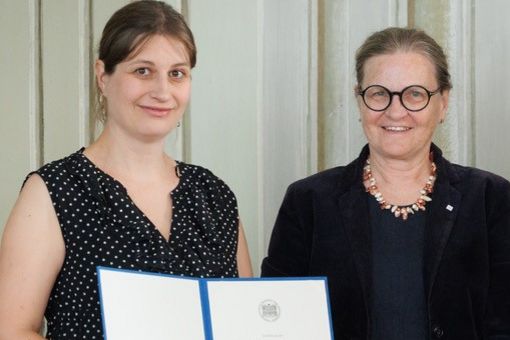
(Vienna, 06 May 2025) Juliane Winkler, a researcher at the Center for Cancer Research at the Medical University of Vienna, has been awarded the Johann Wilhelm Ritter von Mannagetta Prize for Medicine by the Austrian Academy of Sciences. Her groundbreaking work on how cancer spreads in the body (a process known as metastasis) is helping to tackle one of the biggest challenges in cancer treatment today.
Even though cancer therapies have come a long way, metastases — when cancer cells spread to other organs — remain the leading cause of cancer-related deaths. Most treatments focus on the original tumor, but they often fail to stop cancer that has already spread.
Juliane Winkler and her team are taking a different approach. Using cutting-edge techniques that study individual cells, they are investigating how breast cancer spreads to the lungs. Their research has shown that the cells responsible for metastasis are very different from those in the original tumor. These metastatic cells are specially adapted to survive and grow in new tissues, which helps explain why they’re so hard to treat.
Their findings may one day make it possible to identify patients who are at high risk for metastasis — and treat them earlier and more effectively.
A Surprising Role of the Immune System
One of the team’s most important discoveries is that the immune cells in the lungs can start to change even before cancer cells arrive. This process, known as "pre-metastatic niche remodeling," suggests that the body might unknowingly prepare for cancer to spread. This insight could lead to entirely new treatments that prevent metastasis from happening in the first place.
“My research helps lay the groundwork for new immunotherapies that can be used more effectively to fight cancer that has spread,” says Dr. Winkler. “By understanding how metastatic cancer cells adapt and interact with the immune system, I hope to develop better, more targeted treatments.”
About Juliane Winkler
Juliane Winkler trained as a pharmacist and earned her PhD at the University of Heidelberg. She completed her postdoctoral research at the University of California, San Francisco, where she focused on the role of tumor heterogeneity in breast cancer metastasis. Since 2022, she has led her own research group at MedUni Vienna's Center for Cancer Research. Her research group works at the interface of experimental and computation biology and is applying technology-driven systems-oncology approaches that lead to meaningful insights into the complex biology of metastasis and the remodeling of metastatic niches.
About the Mannagetta Prize
The Johann Wilhelm Ritter von Mannagetta Prize for Medicine, awarded by the Austrian Academy of Sciences, recognizes outstanding achievements in cancer research. It is open to scientists under the age of 45 working at research institutions in Austria, and honors work that significantly advances our understanding and treatment of cancer.